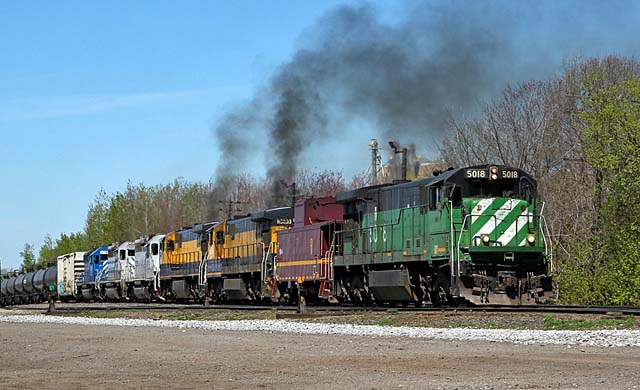

Montreal Maine & Atlantic Railway oil train MMA5018East departs Farnham Yard led by a General Electric C30-7 which is the same model which experienced a fire at Nantes just prior to the catastrophic derailment in Lake Megantic - 3 May 2013 Marc Caya.
9 July 2013 MMA Involved in 130 Accidents
Operates on the Cheap Lake Megantic Quebec - The railway behind the deadly train explosion in Lake Megantic tries to do its transport at lower costs, leading to a much higher accident rate in the U.S. than the national average over the past ten years, experts say.
The Montreal Maine & Atlantic Railway has been involved in 130 accident since 2003, including eight derailments and four collisions since 2010, and 10 derailments in the U.S. since 2003.
Last year, the MMA had on average 34.7 accidents per million miles travelled, the national average is 2.3 accident per million miles.
The information is contained in a searchable database of the U.S. Federal Railroad Administration, as well as facts from the Transportation Safety Board of Canada.
Meantime, MMA CEO Edward Burkhardt has battled with his board of directors because he's long backed the idea of using remote-controlled trains and one-person crews, instead of the usual two-person teams, according to a report in the Wall Street Journal.
"That can be dangerous especially if you have very old tankers," said Jarislowsky Fraser Investments oil and energy expert Denis Durand.
The MMA also buys old equipment and old rail lines, said Durand.
"The trick is to be able to make some money instead of losing some money," said Durand.
Despite its higher-than-average accident rate, the company began hauling oil by rail one year ago, a fact that worries Durand.
"The risk of incurring an accident is 40 times higher by rail than by pipeline," he said.
Canada's railways have pushed to cash in on the crude-oil bonanza, painting themselves as a cost-effective alternative to politically unpopular pipelines like the proposed Keystone XL.
That's led to a whopping 28,000 percent increase in the oil shipped by rail over the past five years, according to Canadian Railway Association statistics.
Author unknown.



Vancouver Island
British Columbia
Canada
| 

